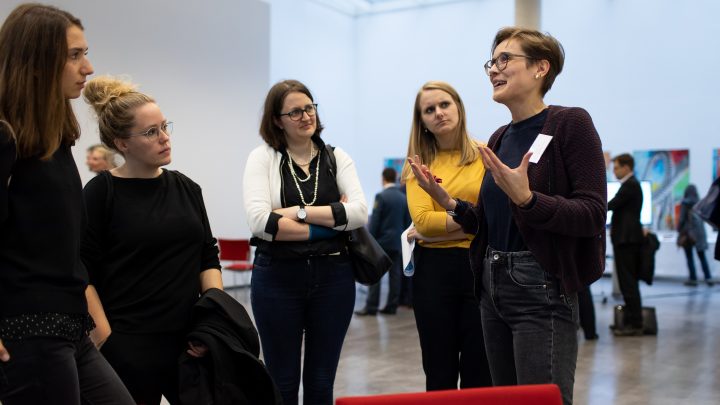CAIS Team im Bereich:
Digital Democratic Innovations

- Goldmann, Anne (2023): Hauptsache Digitalisierung? Zur Positionierung der Parteien im Bereich Digitalpolitik im Vorfeld der Bundestagswahl 2021, in: Korte, Karl-Rudolf et al.: Die Bundestagswahl 2021, Springer VS, Wiesbaden. https://doi.org/10.1007/978-3-658-35758-0_13-1
- Goldmann, Anne (2022): Technologischer Wandel trifft Politikfeldwandel: KI-Politik als Ausdifferenzierung von Digitalpolitik. der moderne staat – dms: Zeitschrift für Public Policy, Recht und Management, 15(2), 331-352. https://doi.org/10.3224/dms.v15i2.14
- Bieber, C., Goldmann, A. (2021, September). KI-Governance – Künstliche Intelligenz als Gegenstand politischer Steuerung. Vortrag im Rahmen des 28. DVPW-Kongresses auf dem Panel “Wir haben die Wahl! Verwaltungspolitik im Zeitalter der Digitalisierung”.
- Goldmann, A. (2023, Juni). Artificial Intelligence in the German Parliament – the Commission of Inquiry on AI in the 19th German Bundestag. Vortrag im Rahmen der 6. ICPP in Toronto auf dem Panel “Transformation of the policy and regulatory agendas of emerging technologies”.
- Goldmann, A., Baum, J. (2023, Juni). Smart Cities in Metropolitan Regions – Analyzing strategies and funding schemes in the Ruhr Area, Germany. Vortrag im Rahmen der 6. ICPP in Toronto auf dem Panel “Science, Technology and Innovation Policies in Metropolitan Regions”.
- Goldmann, A. & Bieber, C. (2023). Wahlen sind auch nur ein Algorithmus, oder: Zur Politischen Regulierung von Künstlicher Intelligenz, in: Korte, Karl-Rudolf et al.: Regieren in der Transformationsgesellschaft. Impulse aus Sicht der Regierungsforschung, Springer VS, Wiesbaden. https://doi.org/10.1007/978-3-658-41285-2_25
- Baum, J. (2022). The Use of the “I” for Rational Subjectivity – A Comparison between Neo-Kantianism and Boyle. Workshop Transparency and Reflection – Author meets Critics, Leipzig.
- Baum, J. (2022). Ryle on voluntary actions – a dispositional explanation model. 4th Göttingen/Leipzig/Chicago Graduate Conference, Göttingen.
- Baum, J. (2021). Ryle on voluntary actions – a dispositional explanation model. Graduate Workshop in Philosophy of the University College London and University Leipzig, London.
- Baum, J. (2020). Ryle on voluntary actions – a dispositional explanation model. Ryle on Know-How – Conference of University of Chicago and University Leipzig, Leipzig.
- Bieber, C. (2022). The Placeless Parliament. In Parliaments in Wartime. https://verfassungsblog.de/the-placeless-parliament/
- Frechen, N., & Brouwer, S. (2022). Wait, did I do that? Effects of previous decisions on moral decision-making. Journal of Behavioral Decision Making, 1– 15. https://doi.org/10.1002/bdm.2279
- Goldmann, A. & Bieber, C. (2021). KI-Governance – Künstliche Intelligenz als Gegenstand politischer Steuerung. Policy Paper, abrufbar unter: https://www.cais-beta.de/wp-content/uploads/Goldmann_Bieber-2021-Kuenstliche-Intelligenz-als-Gegenstand-politischer-Steuerung.pdf
- Goldmann, A., Schwanholz, J., Delhees, S. & von Schuckmann, A. (2020). Planspiele in der Politikwissenschaft – zu den Versprechen und Fallstricken einer interaktiven Lehr- und Lernmethode. Zeitschrift für Politikwissenschaft 30, 521–538. https://doi.org/10.1007/s41358-020-00238-z
- Plümer S. & Goldmann A. (2020). Künftige Königsmacher? Die Europawahl 2019 aus Sicht der Liberalen. In M. Kaeding, M. Müller & J. Schmälter (Hrsg.), Die Europawahl 2019. Ringen um die Zukunft Europas (S. 53-62). Wiesbaden: Springer VS https://doi.org/10.1007/978-3-658-29277-5_5
- Schmitt, J. B., Goldmann, A., Simon, S. T., & Bieber, C. (2021, November). Interdisciplinarity: Challenge or opportunity? Findings from group discussions among digitalization researchers. Vortrag im Rahmen des Workshops „Benefits and challenges of collaboration in research. Investigating the manifold aspects of mono-, inter- and transdisciplinary collaboration“.